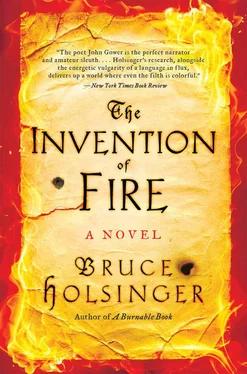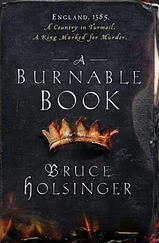Bruce Holsinger - The Invention of Fire
Здесь есть возможность читать онлайн «Bruce Holsinger - The Invention of Fire» — ознакомительный отрывок электронной книги совершенно бесплатно, а после прочтения отрывка купить полную версию. В некоторых случаях можно слушать аудио, скачать через торрент в формате fb2 и присутствует краткое содержание. Год выпуска: 2015, Издательство: HarperCollins, Жанр: Исторический детектив, на английском языке. Описание произведения, (предисловие) а так же отзывы посетителей доступны на портале библиотеки ЛибКат.
- Название:The Invention of Fire
- Автор:
- Издательство:HarperCollins
- Жанр:
- Год:2015
- ISBN:нет данных
- Рейтинг книги:3 / 5. Голосов: 1
-
Избранное:Добавить в избранное
- Отзывы:
-
Ваша оценка:
- 60
- 1
- 2
- 3
- 4
- 5
The Invention of Fire: краткое содержание, описание и аннотация
Предлагаем к чтению аннотацию, описание, краткое содержание или предисловие (зависит от того, что написал сам автор книги «The Invention of Fire»). Если вы не нашли необходимую информацию о книге — напишите в комментариях, мы постараемся отыскать её.
The Invention of Fire — читать онлайн ознакомительный отрывок
Ниже представлен текст книги, разбитый по страницам. Система сохранения места последней прочитанной страницы, позволяет с удобством читать онлайн бесплатно книгу «The Invention of Fire», без необходимости каждый раз заново искать на чём Вы остановились. Поставьте закладку, и сможете в любой момент перейти на страницу, на которой закончили чтение.
Интервал:
Закладка:
“Oh, I am here for you, Gil, and only you.”
He shifted his weight. “Whatever for?”
“As I understand it you spoke rather freely to a hermit in recent days.”
“A hermit, sire?”
“A hermit of our mutual acquaintance.” My head tipped back toward the walls. “A fellow who lives out there, above Cripplegate.”
He took a half step away, his mouth fixed in a line. I followed his gaze as he looked up and out across the top of the screen. From where we stood you could see nothing of the walls or the upper reaches of Cripplegate, though Cheddar seemed to be peering through the layers of wood and stone to that low window where he had spoken to Piers Goodman.
“I would very much like to learn about your conversation with our unkempt friend, Gil.” I had moved my hand to the purse at my waist. I lifted a coat flap and showed it, though the sight seemed to terrify more than please him. The acolyte glanced toward the vestry, took in the stances of the workers by the altar, assessing the dangers of speaking to this intruder.
“Not here,” he said quietly. “The coops, outside Guildhall Yard?”
“I know them,” I said. A line of chicken houses along Basinghall Street, a short walk down from Cripplegate.
“I should not be long,” he said. “Give me the quarter part of an hour.”
The vestry door groaned open, the parson returning to the nave to call out an instruction to an unseen subordinate. Hunching slightly, I took a few sidelong steps and ducked through the screen door, then hurried down the aisle and back out onto the porch. The sun had made no further effort to crest the walls, only brushing my face once I entered through Cripplegate and turned left past Brewers’ Hall, nestled just east of the inner gatehouse. I crossed Guildhall Yard and entered Basinghall Street, a narrow, snakelike thoroughfare extending south from the wall to Cheapside, and always bustling with hucksters selling everything from unskinned coneys to silver plate.
There was city business being transacted out here as well, mayor’s men taking small coin, dispensing false promises in exchange, and above it all rose the shouts of the criers in a sonorous dance of service and enticement.
“Buy any ink, will ye buy any ink? Buy any very fine writing ink, will ye buy any ink and pens?”
“Any rats or mice to kill? Have ye any rats or mice to kill in your homes and stables, good London? Rob the Ratsbane, at your service!”
“White radishes, lettuces, more radishes, two bunches a farthing!”
“Have ye a sore tooth, an aching gum, an abscess or a bleeder? For know that I am Kindheart the Tooth-Drawer, my good people, with gentle pincers in my hand and opium in my purse.”
The criers rattled on, their pitches rising to an impossible volume as I passed down the street.
Then, from the top of the way, the din of a herald’s bell, sharp brassy clangs cutting through the street noise. The sound abated as a tall young man in the royal livery stepped up on a half barrel, looking down at the commons and asking for our silence and attention.
He was a palace man, recognizable as one of the showy types increasingly favored by King Richard in those years. A rich coat buttoned tightly at his neck, a fur-trimmed cape chiseled with decorative slits, long legs in particolored hose, three ostrich feathers stemming ostentatiously from his hat. He spread his arms, shook his feathers like a plumed bird, then brought his hands to his mouth, cupping the rhythm of his cries.
“ And now for a taste of foul crime, my good gentles and commons! Now shall I shout of brigands and killers, slayers and thieves! A poacher of pigeons, a smith turned to pilfer! The most lawless of ladies at large in our land! ”
He had our attention. Several outliers moved closer to the crier’s perch, crowding in and looking up at the man’s raised and thinly bearded chin as he went on.
“Now give me your ears and your good hearing, people of London! Know all present that Robert Faulk, cook of Kent and poacher of His Highness the king’s forests, along with Margery Peveril, gentlewoman of Dartford and murderess of her husband, having jointly slain a sheriff’s turnkey and escaped from the sheriff’s gaol at the manor of Portbridge, do now flee, together or alone, through country and city, their destination unknown, with great bounty from King Richard to any man who would aid in their apprehension and seizure, singly or together.”
There were scattered exclamations, a fair amount of murmuring at the notion of a murderess at large. The crier repeated the announcement, added a brief description, then went on to shout a series of royal proclamations. The crowd loosened, the hubbub returned. Soon enough the royal servant’s drones were drowned beneath the renewed barks of the hucksters and their hired mouths.
“Oysters! Oysters! Oysters! Get your oysters here, and your eels!”
“Grind your knives or your shears? The sharpest blades in London ground here, my good gentles!”
“There is Paris, there is Paris in this thread, the finest in the land!”
The poulterers’ coops stood along the western span of the street, forming a low, loud wall of fowl that lent an air of barnyard looseness to this city lane. The old ordinances had tried to restrict the poulterers to the wall by All Hallows, though recent mayors had proved more lenient. Hens pushed their feathers and beaks through the slats in a ceaseless hunt for grains, while a rooster strutted proudly along the perimeter. The constant murmur made a happy cover for conversations both ill intentioned and benign.
I gathered a handful of kernels from between the pavers and was pushing them through the slats of the nearest coop when I felt a hand at my shoulder. I turned into the thick-lidded eyes of Adam Pinkhurst, a scribe for the new common serjeant at the Guildhall. As always I was distracted by the pied spectacle of his face, a patchwork of burned and healthy skin patterned like some elaborate Moorish cloth, as if he had got in the way of one of an alchemist’s acid flasks.
“John Gower,” he said, the cleft in his chin deepening as he spoke, his gaze direct and confident, regarding me as an equal. Pinkhurst’s stature among the Guildhall clerks had grown somewhat over the last few years since Chaucer had designated him as his favored copyist, commissioning three manuscripts of his poem on Troilus. I had never employed his services for my poetry, preferring to hire a dedicated bookman along Paternoster Row rather than a city scrivener like Pinkhurst. The Guildhall scribes were notorious for passing around unauthorized copies of their clients’ work, and I had no desire to see my making treated like so much fodder for the common gut. Though Pinkhurst, by near-universal acclaim, was trustworthy and discreet, I knew him as a forger of remarkable skill.
“Pinkhurst,” I said as we clasped hands, his ink-stained but smooth. “What brings you out of your cage?”
He grimaced. “I drew the short lot today, so I go in search of pies for our chamber of scribblers. Pork, chicken, liver, dog, friar-makes no difference, so long as they’re not rancid. Six pies, then I’m back to inking, sadly enough, and on such a delightful day.”
“It is that,” I agreed, appreciating the man’s wit. It was no surprise he was Chaucer’s favorite; Geoffrey had told me that Pinkhurst had more than once suggested alternative rhymes and phrases in the margins of his rough copies, just the sort of revisions and improvements to which Chaucer so often subjected my own verse-yet only rarely accepted from me in turn.
He saw the kernels in my hand. “And you? Are you considering renting yourself a chicken coop, relocating from Southwark to Basinghall Street?”
Читать дальшеИнтервал:
Закладка:
Похожие книги на «The Invention of Fire»
Представляем Вашему вниманию похожие книги на «The Invention of Fire» списком для выбора. Мы отобрали схожую по названию и смыслу литературу в надежде предоставить читателям больше вариантов отыскать новые, интересные, ещё непрочитанные произведения.
Обсуждение, отзывы о книге «The Invention of Fire» и просто собственные мнения читателей. Оставьте ваши комментарии, напишите, что Вы думаете о произведении, его смысле или главных героях. Укажите что конкретно понравилось, а что нет, и почему Вы так считаете.












